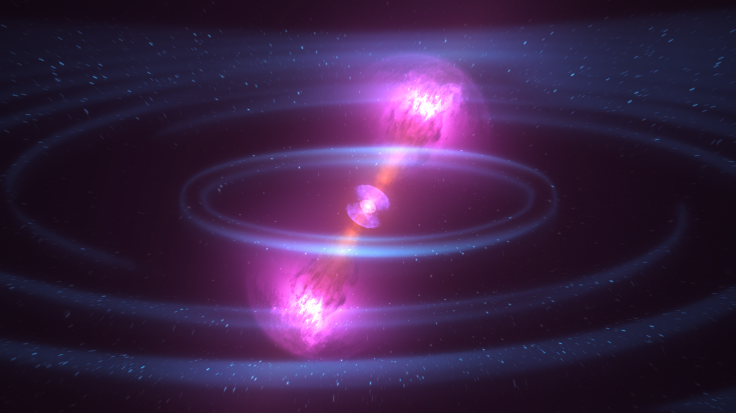This Massive Neutron Star Collision May Have Created Earth's Gold And Uranium

Scientists have discovered that a massive neutron star collision may have given birth to some of Earth's most precious elements, including gold, platinum and uranium. Researchers recently identified a violent crash of two neutron stars 4.6 billion years ago. This collision, which occurred close to our solar system, could have given birth to the heavier elements in our solar system.
"This means that in each of us we would find an eyelash worth of these elements, mostly in the form of iodine, which is essential to life," astrophysicist and professor at Columbia University, Szabolcs Marka, said in a statement. "A wedding ring, which expresses a deep human connection, is also a connection to our cosmic past predating humanity and the formation of Earth itself, with about 10 milligrams of it likely having formed 4.6 billion years ago."
According to Marka, meteorites that were formed in the early solar system contain traces of radioactive isotopes. These particles "act as clocks" when they age and decay, and can be used to reconstruct the timeline of their creation, according to Imre Bartos, the new study's lead author and assistant professor at the University of Florida. The researchers analyzed samples from previously collected meteorites and discovered that a massive neutron star collision could have occurred close to our solar system, around 100 million years before our planet was formed.
"If a comparable event happened today at a similar distance from the Solar System, the ensuing radiation could outshine the entire night sky," Marka said.
“[These elements] are a tiny fraction of 1 percent of the universe, but they’re highly useful to us in many ways,” David Helfand, an astronomer and professor at Columbia University, told Gizmodo. “Just knowing where they came from helps us feel a little bit more at home in the universe.”
The scientists believe that the new research could shed more light on how our planet and solar system came into existence.
"It sheds bright light on the processes involved in the origin and composition of our solar system, and will initiate a new type of quest within disciplines, such as chemistry, biology and geology, to solve the cosmic puzzle," Bartos said.
"Our results address a fundamental quest of humanity: Where did we come from and where are we going? It is very difficult to describe the tremendous emotions we felt when realized what we had found and what it means for the future as we search for an explanation of our place in the universe, " Marka said.
© Copyright IBTimes 2024. All rights reserved.





















